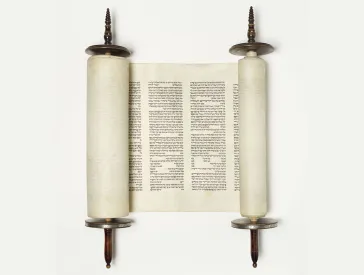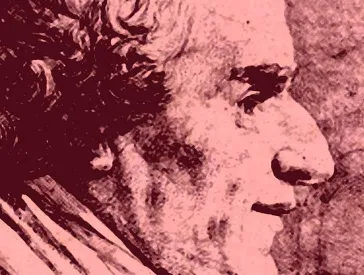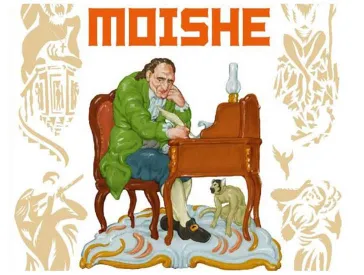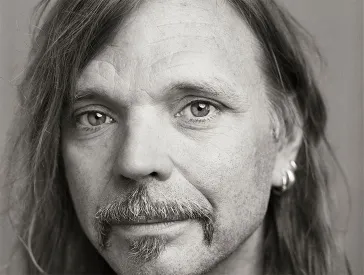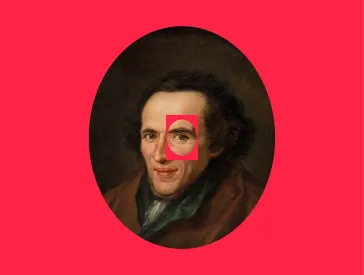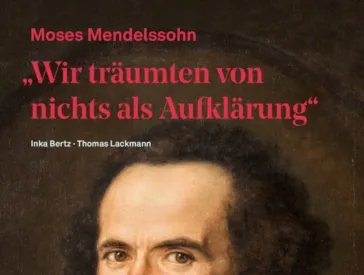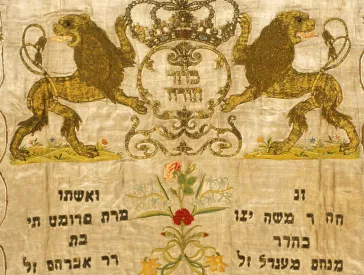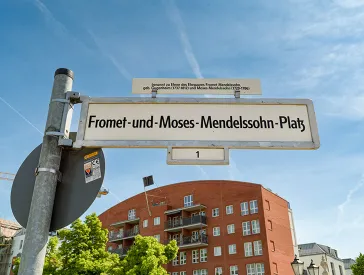Moses Mendelssohn
Philosopher
In mid-18th century Berlin, a process began which was to fundamentally change Jewish life throughout Germany: Jews moved out of the isolation in which they had been living, calling age-old traditions and ways of thinking into question and adopting the language, culture, and conventions of their surrounding environment. Moses Mendelssohn (1729–1786), the great philosopher of European Enlightenment, played a crucial role in furthering this development.
In 1743, Mendelssohn came to Berlin as a young Talmud scholar. In Dessau, where he grew up, he had studied the Bible, the Talmud, and the writings of the medieval Jewish philosopher Moses Maimonides. Now, he was learning modern languages and secular sciences—thereby daring to step out of the confines of traditional Jewish life.
At first he earned his living as a private tutor, then as a bookkeeper and partner of the silk manufacturer Isaac Bernhard. Mendelssohn suffered under his office work, as it kept him from his studies: “This business! This annoying business! It’s driving me into the ground and consuming the energy of my best years.”
Inspired by his friend, the poet Gotthold Ephraim Lessing, Mendelssohn himself began to publish. He became known as the “German Socrates” after the publication of his book Phaedon or On the Immortality of the Soul (1767). He dedicated himself to tolerance among the religions.
Probably Elimelech Polta Ben Simson Rofe, Portrait of Moses Mendelssohn, after 1767, gouache on horn or ivory; Jewish Museum Berlin, accession 2001/357/0, photo: Jens Ziehe
In Jerusalem or On Religious Power and Judaism (1783), he tried to harmonize Judaism with the philosophy of the Enlightenment.
As no other Jew before him, Mendelssohn left his mark on the culture of his time—all the while living strictly according to the precepts of the Jewish religion. Later generations saw in him the first modern German Jew, and he became the symbolic figure of the Haskalah.
What is Haskalah?
Haskalah, (Hebr. for education or enlightenment), describes the age and the movement of the Jewish Enlightenment in the 18th/19th century
Moses Mendelssohn’s Life in Dates (1729–1786)
| 1729 | Born on September 6 in Dessau |
|---|---|
| 1735 | Attends Talmudic school, with studies in the Torah as well as Hebrew grammar and poetry |
| 1737 | Birth of Fromet Gugenheim, Mendelssohn’s future wife |
| 1739 | Takes lessons with Rabbi David Fränkel in Dessau |
| 1740 | Frederick II becomes King in Prussia |
| 1743 | Moves to Berlin. Studies languages, philosophy, and mathematics |
| 1750 | Tutors the children of silk merchant Isaak Bernhard. Restricted by Prussia’s regulations regarding Jews |
| 1753 | Befriends poet Gotthold Ephraim Lessing |
| 1754 | Becomes the bookkeeper for Isaak Bernhard’s silk manufactory. Befriends publisher Friedrich Nicolai |
| 1755 | Joins the Scholarly Coffeehouse, an Enlightenment gathering place. Visits the Monday Society |
| 1756 | Learns to play piano. A discussion with Lessing and Nicolai leads to their |
| 1757 | Publishes the Library of the Belles Lettres and Liberal Arts with Friedrich Nicolai |
| 1760 | Gotthold Ephraim Lessing leaves Berlin |
| 1761 | Becomes engaged to Fromet Gugenheim in Hamburg. Exchanges letters with her. Publishes Philosophical Writings |
| 1762 | Marries Fromet Gugenheim after being granted residency rights in Berlin. They settle at Spandauer Strasse 68 |
| 1763 | Declared an “Extraordinary Protected Jew.” Receives first prize from the Academy of Sciences. The Jewish Community exempts him from dues |
| 1765 | Collaborates on Friedrich Nicolai’s General German Library |
| 1767 | Publishes Phaedon, which will be his most successful book |
| 1768 | Isaak Bernhard dies. Mendelssohn becomes co-owner of the silk factory |
| 1769 | Has a public dispute with Christian theologian Johann Caspar Lavater, who challenges him to convert |
| 1770 | Begins translating the Psalms |
| 1771 | King blocks his election to the Academy of Sciences. Honored by the Jewish Community. Becomes gravely ill |
| 1772 | Takes a stance against the traditional Jewish practice of immediate burial |
| 1773 | Stays at the Bad Pyrmont health resort |
| 1774 | Begins work on Torah translation |
| 1777 | Converses with Immanuel Kant in Königsberg. Visits Gotthold Ephraim Lessing in Wolfenbüttel for the final time |
| 1778 | The Jewish Free School is founded at Mendelssohn’s suggestion. Reads Lessing’s draft of Nathan the Wise |
| 1779 | Mendelssohn’s request to have his letter of protection extended to his wife and children is denied |
| 1780 | EThe first volume of his Torah translation into German appears, written using the Hebrew alphabet. Consulted for Dohm’s treatise on Jewish emancipation |
| 1782 | Participates publicly in the debate over emancipation |
| 1783 | Appointed honorary member of the Society of Friends of the Enlightenment. Becomes dignitary of the Jewish Community. The Psalms and Jerusalem are published |
| 1784 | Immanuel Kant’s definition of Enlightenment and Johann Georg Hamann’s book opposing Jerusalem are published |
| 1786 | Moses Mendelssohn dies in the presence of the physician Marcus Herz |
